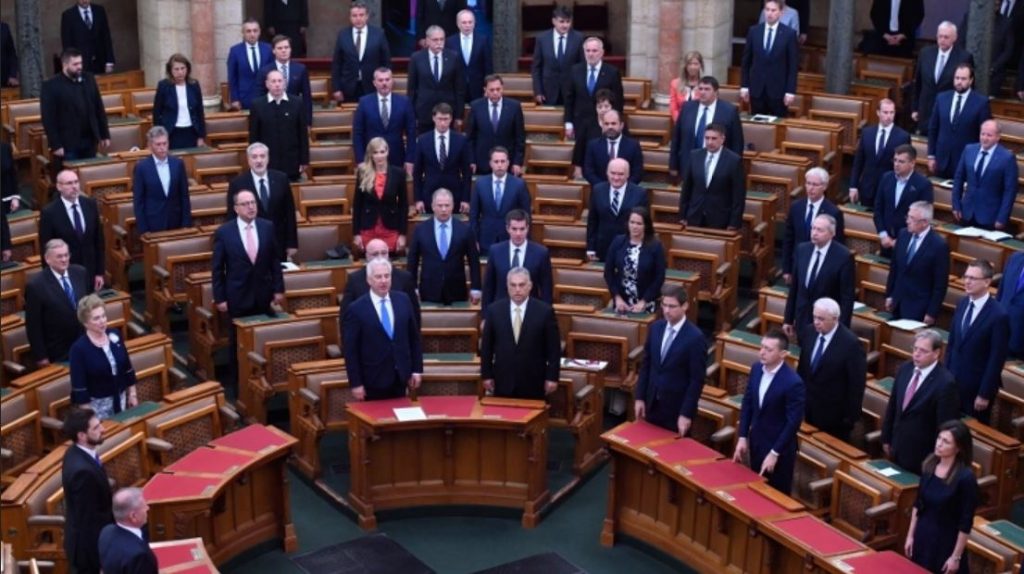Miklós Ligeti, Legal Director of Transparency International Hungary, explains the legal scheme enabling the Hungarian government to channel billions of euros to private foundations. He reveals the most important legal details and tells us why the move is tailor-made for Hungarian prime minister Viktor Orbán’s personal leverage and outreach – even if being ousted from the head of government’s position.
Host: Balázs Csekő
Hungary’s move to shift billions of euros in funds is the latest attempt by the ruling Fidesz party to secure political influence, even if losing the power one day. After a parliamentary vote in April, the government decided to transfer control of state assets in the spheres of higher education, health care, management of public assets and mother tongue culture to quasi-public foundations led by close allies of the country’s prime minister, Viktor Orbán.
“The fact that the Hungarian government misappropriates public funds and uses it partly to enrich leading members of the clientele of the political elite and oligarchs belonging to the conglomerate of a clan-like gang of people who really rule the country, is not unprecedented,” Mr Ligeti from TI Hungary told CEA.
A novelty, however, is the combination of the amount of public money involved in the transactions with the “supposedly premeditated manner and technique”. This was refined and introduced to give a legal scaffolding to the actions and endeavors that Viktor Orbán’s government is now pursuing.
Public money losing its public character
Public institutions in Hungary started to establish foundations in 2013. Back then, the country’s Central Bank set up foundations from Hungarian public money worth of 1 billion USD. In that case, the recipients were old-fashioned private law foundations.

Photo credit: Ákos Stiller, Bloomberg
With several lawsuits against the move, law courts and the Constitutional Court of Hungary declined the argumentations and implementations put forward by Hungary’s Central Bank, being the founder and the endower at the same time. The courts ruled that the foundations were closely related to the founder and claimed that all the money, transferred to the foundations, lost its “public character”. Their financial operations should have been consolidated to the state books.
Innovative procedure
In order to avoid a similar ruling in the future, the Hungarian government decided to opt for an alternative approach. This time, the entities established by the executive branch, are namely private foundations.
“The laws and by-laws, and articles of incorporation which govern their internal and external life, reveal a disappointing picture where these entities operate as self-propelled, autonomous bodies with no oversight, no supervision, no link to the founder, and no clear definition whether they are private or public,” Mr Ligeti stated.
The mission of these foundations is to carry out public duties in the spheres of higher education, health care or management of public assets. The funds that these unprecedented entities receive equal an amount of public money worth of 3-4 billion Euros.
“We don’t know how these will fit in the scheme of regular private law or public law organizations, but we know there will be no parliamentary, government or fiduciary control over their functions, operations or existence,” the lawyer said.

Photo credit: Zoltán Máthé, MTI
“The leadership will be selected in a shady process without any transparency measures to be applied,” he added.
Although the amount of 3-4 billion Euros is a substantial portion of the Hungarian public funds, the sum of money being extracted through public procurement processes, and the questionable allocation of EU funding, is significantly higher.
Money gone forever?
Whether a future non-Fidesz government will be able to recover the public money, recently channeled to foundations, remains in question. The chances for such a move, however, are not very promising. “The question is where the money will be in that future point of time,” Mr Ligeti added.
Foundations are autonomous in their economic decisions. The laws governing the entities stipulate that these may invest as shareholders following the principle of market investors. “Foundations may take economic risks and even lose the money without serious consequence.”
In case a future non-Fidesz government had the constitutional majority and took legal steps in order to recover the assets now being lost, the funds, by then, may be gone forever with the foundations remaining there as empty nutshells. “That’s a fearful prospect.”
Not in the sphere of the government
The articles of incorporation of a foundation play a key role in the entity’s life as they serve as the internal constitution. Normally, the founder is the only one entitled to modify the articles of incorporation. Under special circumstances, the court gets the right to amend these.
Once the newly-established foundations are operating, also Hungary’s current government, although being the founder, will lose the possibility to reach out to the parts of public asset, which have been transferred to the entities. The law, approved by the Hungarian parliament last April, states that the foundations will lose almost automatically all ties which keep them in the sphere of interest of the government and the parliament.

Photo credit: Attila Kisbenedek, AFP
Even if a future government or parliament, in position of a constitutional majority, tried to revoke the transfers and disband the foundations, it would face some serious legal difficulties. The articles of incorporation, according to the new law, can only be modified by the foundations’ Board of Trustees. Mr Ligeti calls this as “Catch-22” and sees the only way out of it with a revolutionary rule of law approach.
Hungarian Unicum
A similar cocktail of foundation regimes is hard to find abroad, while parts of the legislation were put together by taking foreign examples. “What the Hungarian government does is an idle cherry picking of elements of different foreign regulations and traditions,” TI Hungary’s legal director said.
“This is very Hungarian. We believe that this has a specific goal to serve, which is to have as much public assets under the control of friendly hands and in the pockets of friendly owners as practicable.”
Setting up a deep state?
Many speculate the ultimate goal of the recent legal innovation by the Orbán government is the creation of a deep state. TI Hungary believes this assumption is not entirely accurate. “This explanation takes only into account a scenario where there is a parliamentary majority of a non-Fidesz conglomerate, and a government with a different political composition.”
Such a scenario supposes that Mr Orbán or Fidesz, being in the opposition, can to a large extent paralyze the functions and works of a future government which is non-Fidesz. However, the undermining of a future non-Fidesz government’s efforts would have been also possible without the foundations being put in place.
“There are so many Fidesz appointees in public institutions of the traditional checks and balances system, that are now captured by loyalists, that any non-Fidesz government will have a hard time to find avenues of cooperation with the Constitutional Court, the State Audit Office and the Prosecutor’s Office,” Mr Ligeti claimed.
Perpetuating Orbán’s leverage
The story is more complex.
The financial moves initiated by the Hungarian government serve the goal to “perpetuate” Mr Orbán’s personal leverage and outreach.

Photo credit: Botost, 444hu
His friends and individuals under his personal influence are being selected and appointed to the Board of Trustees of the foundations. “Not even Fidesz without Mr Orbán can potentially have a firm say in what these Boards and these foundations will do, because these are the institutions personally being linked to Mr Orbán.”
“This move can be identified from a certain perspective as equally serving to give financial and institutional backup to Fidesz, potentially serving in the opposition in the future, and Mr Orbán potentially not being Fidesz number one after a point in time.”
Individual checks and balances
However, traditional checks and balances in Hungary have been suffering for many years, the prime minister and some other key functionaries of the country’s current elite exercise some personal and individual checks and balance. These, on the other hand, mark the Achilles heel of the system led by Viktor Orbán. “Once these key individuals are taken out of the system, it may collapse, because there is no institutional scaffolding beneath,” Mr Ligeti emphasized.
The fact that Hungary’s rule of law and anti-corruption performance decline, is also reflected by the conclusions in TI’s Corruption Perception Index. The ranking, in which Hungary is clearly lagging behind the expectations, shows how experts and investors judge the governments’ anti-corruption role.
Hungary, once an apt pupil in Central and Eastern Europe in the post-Soviet era, now shares the last position in the EU on corruption with Bulgaria and Romania. “What is even more disappointing, is that Bulgaria and Romania are coming upwards, but Hungary is going downwards,” Mr Ligeti concluded.
Cover photo credit: László Balogh, AFP

Miklós Ligeti is a lawyer and legal director at Transparency International Hungary. He has a strong law enforcement and prosecution background. Before starting to be active for TI Hungary, he worked at the Prosecutor’s Office, the Ministry of Justice and the Ministry of Interior. In addition to the codification tasks of criminal law, law enforcement and national security, he was dealing with crime measurement and the operation of the criminal and law enforcement statistical system.
Photo credit: Transparency International Hungary



